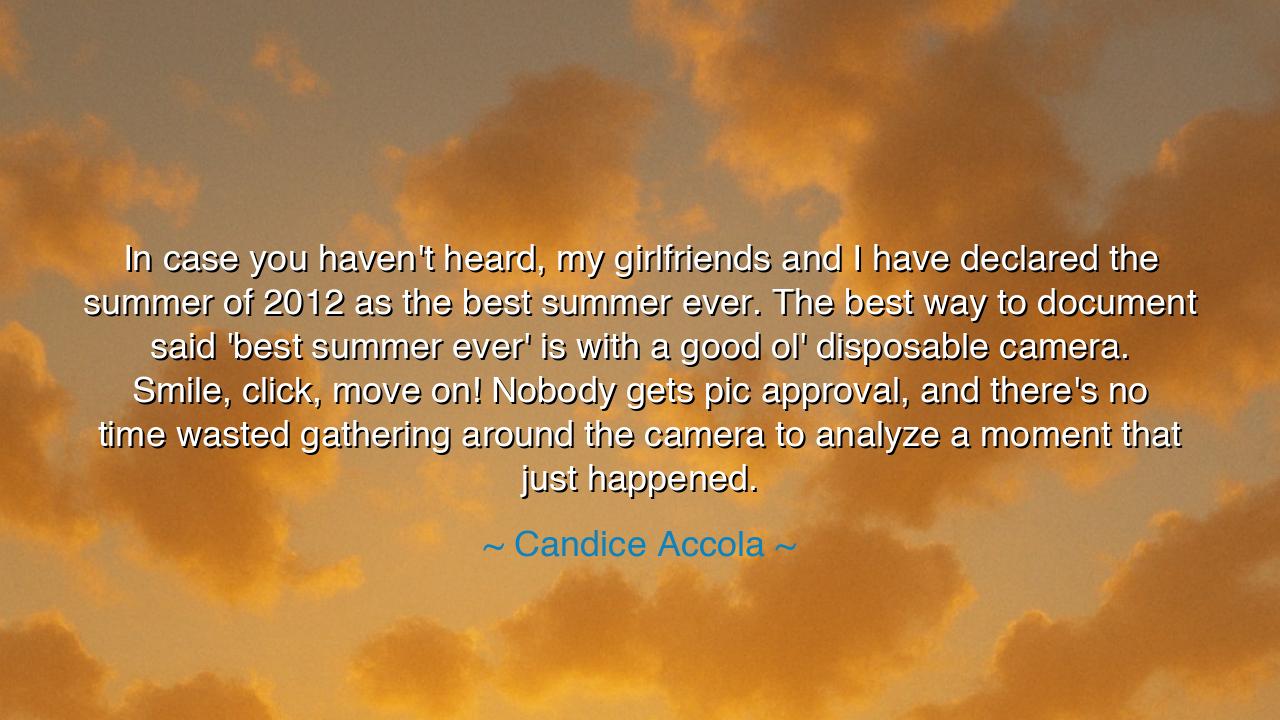
In case you haven't heard, my girlfriends and I have declared the
In case you haven't heard, my girlfriends and I have declared the summer of 2012 as the best summer ever. The best way to document said 'best summer ever' is with a good ol' disposable camera. Smile, click, move on! Nobody gets pic approval, and there's no time wasted gathering around the camera to analyze a moment that just happened.






The words of Candice Accola, “In case you haven’t heard, my girlfriends and I have declared the summer of 2012 as the best summer ever. The best way to document said ‘best summer ever’ is with a good ol’ disposable camera. Smile, click, move on! Nobody gets pic approval, and there’s no time wasted gathering around the camera to analyze a moment that just happened,” may sound lighthearted and playful, yet they reveal a truth of ancient weight: that life is best lived in the present, not imprisoned by endless judgment. In this simple ode to a disposable camera, Accola teaches us to embrace imperfection, spontaneity, and the fleeting nature of joy.
A smile, a click, and the command to move on—these are not just instructions for photography, but for living. Too often we linger in the past, dissecting our actions, replaying our words, longing to edit what has already occurred. But the disposable camera knows no perfection, no revision. It captures life as it is: messy, unposed, vibrant. In this way, it becomes a mirror for the soul’s deepest need—to be free from scrutiny, to live without fear of approval.
The ancients understood this wisdom. Consider the story of the Greek soldier who carved his memory of battle into the bark of a tree, knowing it would fade with time. He did not etch for eternity, but for the present—to honor the fleeting moment. Likewise, Accola’s words remind us that not every joy needs polishing, not every memory needs to be flawless. The beauty lies in its impermanence, in the fact that it happened once, and will never happen again.
Her rejection of approval-seeking speaks even louder in our age, where every image is filtered, every moment rehearsed, and every memory reshaped for the eyes of others. She rejects this bondage and returns to something raw, almost primal: the disposable image, unedited, unrefined, taken once and never questioned. This is a rebellion against the tyranny of perfection, a return to authenticity. The disposable camera, humble and imperfect, becomes a symbol of freedom.
Think, too, of Ernest Hemingway’s Paris in the 1920s, a time he later called a “movable feast.” Those days were filled not with careful planning, but with moments lived fully—wine shared, laughter ringing, art born from the immediacy of life. If one had paused to “approve” each memory, the fire of that era might have dimmed. Instead, like Accola’s summer of 2012, it burned brightly because it was lived without hesitation, captured only in fleeting words and fading photographs.
The lesson, then, is profound: Do not waste life in endless analysis of moments already gone. Do not burden joy with perfection. Instead, smile, click, move on. Embrace the imperfect memory, for its imperfection is its truth. Better to have lived a hundred flawed moments than to waste one precious second trying to make them flawless.
To practice this wisdom, let us set down the need for control. Take a photograph without checking it. Speak a kind word without rehearsing it. Laugh without worrying how it looks. Declare a season of your life as your own “best summer ever,” not because it is perfect, but because you have chosen to honor it with joy. In this way, your life becomes a collection of living moments, not staged performances.
So remember, O seeker of tomorrow: the best way to document life is not to perfect it, but to live it. Hold your disposable camera close—not only in hand, but in spirit. Let each smile be honest, each memory unedited, each day lived as though it were already enough. For in truth, the greatest treasures are not the polished images, but the raw moments that, once passed, can never be repeated.






AAdministratorAdministrator
Welcome, honored guests. Please leave a comment, we will respond soon